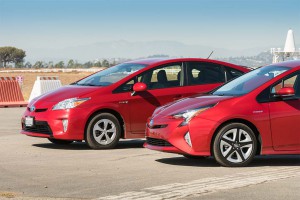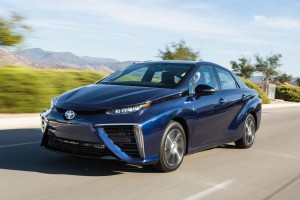
The batteries powering the Prius has been the closest Toyota's been to a pure EV since it retired the RAV4 a few years back.
Long skeptical about lithium-ion technology, Toyota has confirmed it is working on long-range electric vehicles but a new report says the maker could be working on a breakthrough technology that resolves many of the problems associated with today’s batteries.
According to the Chunichi Shimbun daily, Toyota wants to bring to market in 2022 an electric vehicle that would shift to so-called solid-state batteries. That approach has been a Holy Grail for battery researchers because the technology is theoretically capable of both increasing range and reducing charging times, making electric vehicles as easy to use as today’s gasoline-power products.
Whether Toyota can commercialize solid-state technology by early in the next decade is far from certain, but it isn’t the only manufacturer working on the concept. Henrik Fisker, founder and CEO of Fisker Automotive, told TheDetroitBureau.com on Monday that his company is also working on solid-state batteries, but cautioned, they are “at least five years out,” or roughly in line with the reported target date for Toyota.
The Japanese giant declined to comment on the news report, but senior officials have told TheDetroitBureau.com on several occasions they are actively looking for new battery alternatives, including solid-state technology.
(Toyota invests $100m in new venture to develop disruptive technologies. For the story, Click Here.)
Until recently, Toyota’s skepticism led it to focus on hydrogen fuel-cells as a path to future clean mobility. But the high cost of that technology – along with the lack of a widespread hydrogen infrastructure has raised serious concerns about whether fuel-cell vehicles will ever make it into the mainstream.
As a result, Toyota now says it will also pursue battery-based technologies, starting with a Chinese-made variant of the C-HR crossover due to market in 2019.
But the carmaker appears to be viewing trouble-prone lithium-ion chemistry as a short-term fill-in as it races to catch up with competitors like Nissan, General Motors, Volkswagen and Tesla. Longer-term, it appears to see alternatives such as solid-state batteries as the real solution.
Lithium-ion batteries rely on a liquid electrolyte to produce power. But the chemistry can be prone to short-circuiting and even catching fire, as was demonstrated by the recent recall of the Samsung Galaxy Note 7 smartphone.
(Click Here to see more about about Toyota ruling out diesel-powered hybrids.)
“Replacing the organic liquid electrolyte with a nonflammable and more reliable inorganic solid electrolyte (SE) simplifies battery design while improving safety and durability,” said a report by Green Car Congress.
It also noted other key advantages, such as packaging, vehicle range and rapid charge cycles. Using 220-volt chargers it can take hours to top off a lithium-powered vehicle, and even 440-volt DC Level 3 charging systems can take up to 30 minutes or more to give an 80% “fill-up” to a vehicle with a range of 200 to 300 miles.
Proponents of solid-state technologies contend that could drop to less than five minutes, or about the same time it takes to fill up a gas tanks.
There are a number of challenges, however, including manufacturability, that have been barriers to production so far.
(Toyota tops automaker patent list. For the story, Click Here.)
With virtually every major automaker working on electrified vehicles, a major breakthrough in battery technology could provide a significant market advantage. So, Toyota is by no means the only one looking at solid-state technology. Others include BMW and Volkswagen, the latter buying a stake in QuantumScape, a start-up spun off in 2010 from research work at Stanford University. The Korea Herald reported earlier this year that Hyundai “is developing solid-state batteries,” and has reached a level where it may also soon lay out production plans.

